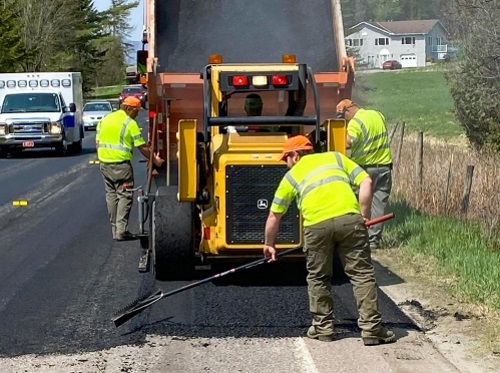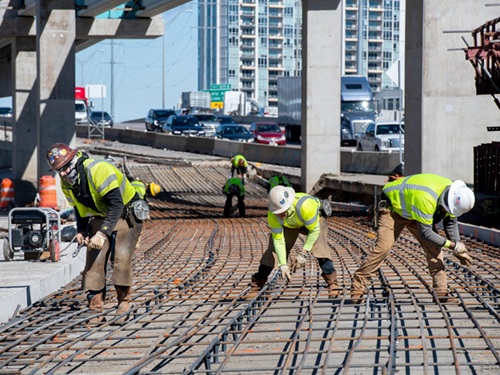The U.S. Department of Transportation issued a 180-day “temporary waiver” on May 19 for “Buy America” rules as they relate to a new category of “construction materials.”
[Above photo by VTrans]
Jim McDonnell, director of engineering for the American Association of State Highway and Transportation Officials, noted that, “the waiver appears to be substantively the same as what was released for comment several weeks ago, and to which AASHTO and many state departments of transportation responded with comments.”
The waiver is applicable to awards obligated on or after May 14 and before November 10, according to the USDOT. In addition, for awards obligated during this 180-day period, the waiver applies for the duration of the award.

Unless extended, the waiver is not applicable to any award obligated on or after November 10. According to the waiver notice, USDOT expects during the transition period for transportation agencies to establish new certification processes and work with industry to ensure compliance.
In the meantime, USDOT will be seeking information and feedback from states, industry, and other stakeholders on challenges with and solutions for implementing the requirement, gathering data on the sourcing of the full range of construction materials used in transportation projects, and determining strategies for increasing domestic capacity to produce those materials.
In a letter sent on May 13, AASHTO provided USDOT with critical feedback regarding the Biden administration’s effort to tighten “Buy America” requirements for infrastructure projects.

AASHTO said state DOTs “support the president’s goal of promoting domestic jobs and encouraging economic growth by maximizing the use of American-made products and materials in federally-funded projects, while also successfully delivering a wide range of critical infrastructure projects across the country” in its to USDOT.
However, state DOTs “have significant concerns” regarding “potential delays and anticipated disruptions to project delivery” due to the new rules, AASHTO said in its letter, requesting an 18- to 24-month extension of the transition period to the new “Buy America” requirements.
“The additional time will help to achieve a less disruptive transition to American-made products, as well as to allow for adjustments in the sourcing of listed construction materials for manufactured products, which don’t appear to be covered by [USDOT’s] proposed waiver,” AASHTO noted.

“The new ‘Buy America’ requirements will exacerbate delay and cost concerns if contractors are forced to abruptly shift material purchases to domestic sources that may struggle with availability due to limited quantities or high demand,” the organization added.
“A more gradual approach to the implementation of the new ‘Buy America’ requirements – including providing support to the industry as they work to increase production and establish new material sources within the United States – is needed to encourage industry development while minimizing disruptions to project delivery and ensuring that current supply issues are not intensified,” AASHTO pointed out.
“USDOT needs to be both thoughtful and flexible with its requirements and restrictions in order to encourage industry growth without inadvertently running existing manufacturers out of business that cannot quickly source American-made materials, and without contributing to the significant inflation in prices that is already occurring,” the group emphasized.
In response to AASHTO’s comments, the waiver notice from USDOT acknowledged that, “the department has heard from stakeholders regarding concerns about the implementation of ‘Buy America’ requirements to construction materials, specifically how recipients of federal funds will need to require contractors to source ‘Buy America’ compliant construction materials and how industry will certify and demonstrate compliance.”
USDOT added that it “recognizes” both the importance of ensuring “Buy America” compliant construction materials and the need to implement the requirement in a way that is not overly burdensome.



